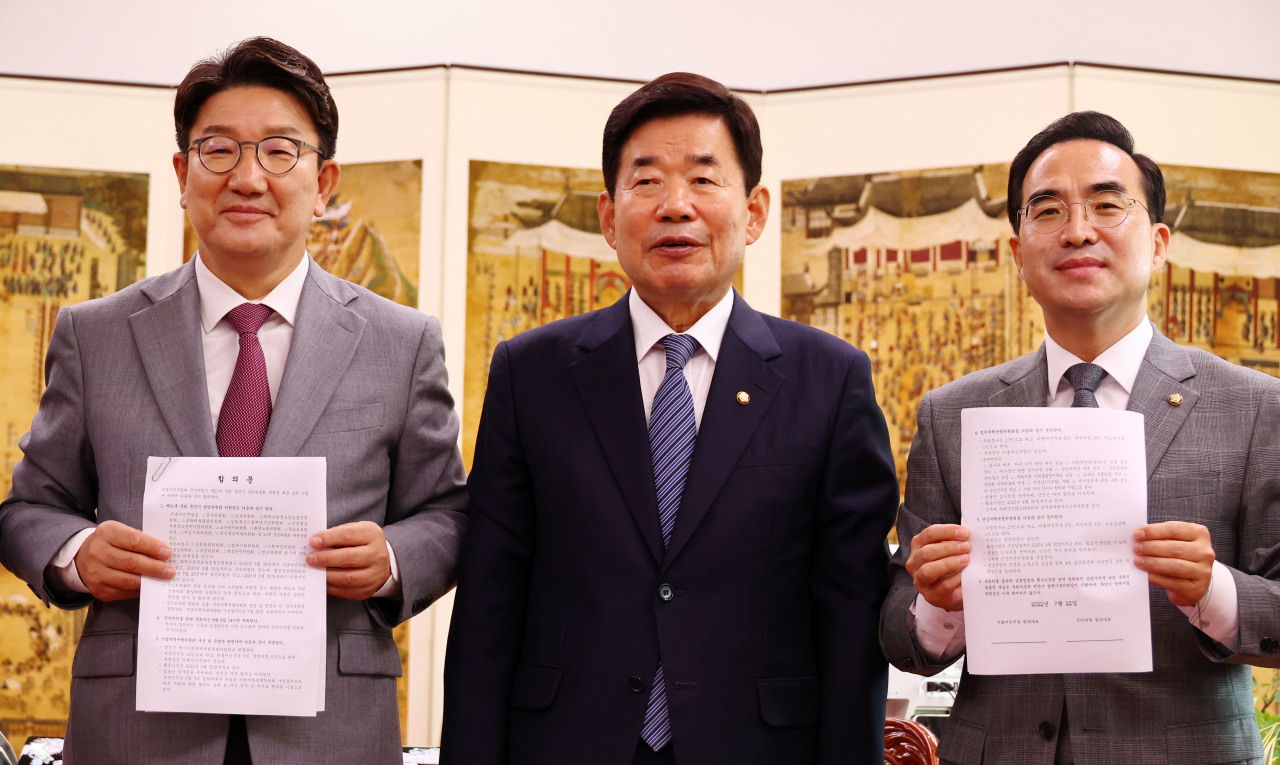
(From left) Rep. Kweon Seong-dong, the floor leader of the ruling party, National Assembly Speaker Kim Jin-pyo and Rep. Park Hong-keun, the floor leaders of the Democratic Party announce the agreement on the parliamentary committee formation at the National Assembly, Friday. Yonhap
The ruling and main opposition parties on Friday reached an agreement on the parliamentary committee formations, finally allowing the National Assembly to restart operations after 53 days of hiatus.
The ruling People Party Party floor leader and acting chair Rep. Kweon Seong-dong and Rep. Park Hong-keun, floor leader of the main opposition Democratic Party of Korea, agreed on the allocation of committee chiefs’ posts at a meeting presided over by National Assembly Speaker Kim Jin-pyo.
According to the agreement, the ruling party will take seven chair posts: the House Steering Committee, Legislation and Judiciary Committee, National Defense Committee, Foreign Affairs and Unification Committee, Intelligence Committee, Public Administration Committee, and the Strategy and Finance Committee.
The Democratic Party will take 11 committees: the National Policy Committee, Education Committee, Science, ICT, Broadcasting and Communications Committee, Culture, Sports, and Tourism Committee, Agriculture, Food, Rural Affairs, Oceans, and Fisheries Committee, Trade, Industry, Energy, SMEs and Startups Committee, Health and Welfare Committee, Environment and Labor Committee, Land Infrastructure and Transport Committee, Special Committee on Budget & Accounts, and the Gender Equality and Family Committee.
The chairmanship of the Science, ICT, Broadcasting and Communications Committee and Public Administration and Security Committee remained as a key issue until the very last minute, as the former will have influence over changes to the governance structure of public broadcasting such as KBS and MBC, and the latter is deeply related to the controversy over the establishment of the police bureau within the Interior Ministry.
The two parties agreed to share the chairmanship of those two committees. The ruling party will take charge of the Public Administration and Security Committee for one year first, and the Democratic Party takes charge of Science, ICT, Broadcasting and Communications Committee for one year first and then shifts.
They also agreed to form a special committee on pension reform to discuss ways to reform the four major public pensions.
For the Special Committee on Judicial Reform, which will follow up the law commonly called as “complete deprivation of the prosecutorial investigative rights” two parties agreed to have 12 members, six from each party. The democratic party will take charge of the committee. The committee’s name will be changed to the Special Committee on Criminal Justice System Reform.






![[KH Explains] How should Korea adjust its trade defenses against Chinese EVs?](http://res.heraldm.com/phpwas/restmb_idxmake.php?idx=645&simg=/content/image/2024/04/15/20240415050562_0.jpg&u=20240415144419)